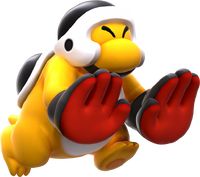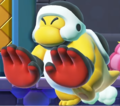Shova: Difference between revisions
m (→Gallery) |
|||
| (21 intermediate revisions by 14 users not shown) | |||
| Line 1: | Line 1: | ||
{{species infobox | {{species infobox | ||
|image=[[File:Shova | |image=[[File:Shova (render) - SMBW.png|200px]]<br>Rendered game model of a Shova. | ||
|first_appearance=''[[Super Mario Bros. Wonder]]'' ([[List of games by date#2023|2023]]) | |first_appearance=''[[Super Mario Bros. Wonder]]'' ([[List of games by date#2023|2023]]) | ||
|variant_of=[[Koopa (species)|Koopa]] | |variant_of=[[Koopa (species)|Koopa]] | ||
|comparable=[[Chargin' Chuck | |comparable=[[Chargin' Chuck]]<br>[[Sumo Bro]] | ||
}} | }} | ||
'''Shovas''' | '''Shovas''' are large [[Koopa (species)|Koopa]]s that first appear in ''[[Super Mario Bros. Wonder]]'', with yellow skin, black helmets, and black [[Buzzy Beetle]]-esque shells, making them resemble the [[Hammer Bro]]s. of ''[[Super Mario Bros. 3]]'', with a large body size much like [[Sledge Bro]]s. and [[Sumo Bro]]s. (which also share their squinted eyes), though, compared to most Koopas, they lack a noticeable snout or beak, instead possessing a mostly-flat face with a heavily-built lower jaw. As indicated by their name, they slowly shove objects such as pipes and boxes forward with their large gloved hands. If the player approaches them head-on, the Shova will push them away without causing damage, though they can still inflict damage like any other enemy if touched from the back or from the bottom (if not in [[Drill Mario|Drill form]]). It take three stomps or three fireballs to defeat a Shova, though they can be more instantly taken out with a [[Ground Pound|ground pound]], a single stomp or trunk strike in [[Elephant Mario|elephant form]], a drill attack, or contact with a player made invincible by a [[Super Star]]. Shovas are introduced in [[Swamp Pipe Crawl]] and are featured prominently in the eponymous [[Secrets of Shova Mansion]], where they pursue the player by pushing a giant golden [[Bowser Statue]] during the level's [[Wonder Effect]]. | ||
==Gallery== | ==Gallery== | ||
<gallery> | <gallery> | ||
SMBW Daisy Sledge Bro enemy.jpg|A Shova | SMBW Daisy Sledge Bro enemy.jpg|A Shova being pushed against a pipe by [[Princess Daisy|Daisy]] | ||
ShovaForeground.png | ShovaForeground.png | ||
Shova model SMBW.png|Rendered model of a Shova | |||
</gallery> | </gallery> | ||
== | ==Additional names== | ||
===Internal names=== | ===Internal names=== | ||
{{internal names | {{internal names | ||
| Line 26: | Line 26: | ||
|Jap=オシダシー<ref>[https://topics.nintendo.co.jp/article/6e4c7b40-bd33-4556-8ec3-0c865904ef13 マリオも仲間もみんなで冒険。シリーズ最多12種類の操作キャラクターをご紹介。【ワンダーの世界へ Vol.2】]. ''Nintendo''. Retrieved October 15, 2023.</ref> | |Jap=オシダシー<ref>[https://topics.nintendo.co.jp/article/6e4c7b40-bd33-4556-8ec3-0c865904ef13 マリオも仲間もみんなで冒険。シリーズ最多12種類の操作キャラクターをご紹介。【ワンダーの世界へ Vol.2】]. ''Nintendo''. Retrieved October 15, 2023.</ref> | ||
|JapR=Oshidashī | |JapR=Oshidashī | ||
|JapM= | |JapM=Comes from「押し出し」(''oshidashi'', pushing something out) | ||
| | |Chi=推推手<ref>[https://www.nintendo.com.hk/topics/article/1Y6G0Od829K8K8VttwoVpi0 瑪利歐與同伴們也和大家一起冒險。介紹本系列歷來最多的12種操作角色。 【前往驚奇的世界Vol.2】]. ''Nintendo Hong Kong''. Retrieved October 14, 2023.</ref> | ||
| | |ChiR=Tuītuīshǒu | ||
| | |ChiM=Partial repetition of「推手」(''tuīshǒu'', "pusher") | ||
|Dut= | |Dut=Shova | ||
|Fre=Poussumo | |Fre=Poussumo | ||
|FreM=Portmanteau of | |FreM=Portmanteau of ''pousser'' ("to push") and "Sumo" (possibly referring to [[Sumo Bro#Names in other languages|Sumo Bro]]) | ||
|Ger=Schiebemax | |Ger=Schiebemax | ||
|GerM=From | |GerM=From ''schieben'' ("to shove") and the male given name "Max" | ||
|Ita=Spintarello | |Ita=Spintarello | ||
|ItaM=The word | |ItaM=The word ''spintarella'' ("shove") in masculine form or a portmanteau with ''fratello'' ("brother") | ||
|Kor=미러내<ref>[https://www.nintendo.co.kr/news/article/2hZSAwpnjYawriP14bIn0W 마리오도 친구들도 모두와 함께 모험. 시리즈 최다 12종류의 조작 캐릭터를 소개. 【원더의 세계로 Vol.2】]. ''Nintendo Korea''. Retrieved October 14, 2023.</ref> | |Kor=미러내<ref>[https://www.nintendo.co.kr/news/article/2hZSAwpnjYawriP14bIn0W 마리오도 친구들도 모두와 함께 모험. 시리즈 최다 12종류의 조작 캐릭터를 소개. 【원더의 세계로 Vol.2】]. ''Nintendo Korea''. Retrieved October 14, 2023.</ref> | ||
|KorR=Mireonae | |KorR=Mireonae | ||
|KorM=Partial pun on "밀어내다" ('' | |KorM=Partial pun on "밀어내다" (''mireonaeda'', "to push out") | ||
|PorA=Edu Empurrão | |PorA=Edu Empurrão | ||
|PorAM=From "Edu" (a | |PorAM=From "Edu" (a short form of the male given name "Eduardo") and ''empurrão'' ("shove") | ||
|PorE=Empurrikoopa | |PorE=Empurrikoopa | ||
|PorEM=From | |PorEM=From ''empurrar'' ("to push") and "Koopa" | ||
|Rus=Толкайка | |Rus=Толкайка | ||
|RusR=Tolkayka | |RusR=Tolkayka | ||
|RusM=From | |RusM=From ''толкать'' (''tolkat'', "to shove") and the diminutive suffix "-ка" (''-ka'') | ||
|Spa=Empujapum | |Spa=Empujapum | ||
|SpaM=Portmanteau of | |SpaM=Portmanteau of ''empujar'' ("to shove") and the onomatopoeia ''pum'' (punching sound) or ''Placapum'' ("[[Chargin' Chuck#Names in other languages|Chargin' Chuck]]") | ||
}} | }} | ||
Latest revision as of 15:06, November 27, 2024
| Shova | |||
|---|---|---|---|
 Rendered game model of a Shova. | |||
| First appearance | Super Mario Bros. Wonder (2023) | ||
| Variant of | Koopa | ||
| |||
Shovas are large Koopas that first appear in Super Mario Bros. Wonder, with yellow skin, black helmets, and black Buzzy Beetle-esque shells, making them resemble the Hammer Bros. of Super Mario Bros. 3, with a large body size much like Sledge Bros. and Sumo Bros. (which also share their squinted eyes), though, compared to most Koopas, they lack a noticeable snout or beak, instead possessing a mostly-flat face with a heavily-built lower jaw. As indicated by their name, they slowly shove objects such as pipes and boxes forward with their large gloved hands. If the player approaches them head-on, the Shova will push them away without causing damage, though they can still inflict damage like any other enemy if touched from the back or from the bottom (if not in Drill form). It take three stomps or three fireballs to defeat a Shova, though they can be more instantly taken out with a ground pound, a single stomp or trunk strike in elephant form, a drill attack, or contact with a player made invincible by a Super Star. Shovas are introduced in Swamp Pipe Crawl and are featured prominently in the eponymous Secrets of Shova Mansion, where they pursue the player by pushing a giant golden Bowser Statue during the level's Wonder Effect.
Gallery[edit]
A Shova being pushed against a pipe by Daisy
Additional names[edit]
Internal names[edit]
| Game | File | Name | Meaning
|
|---|---|---|---|
| Super Mario Bros. Wonder | G:/romfs/Model/EnemyOsukun.bfres.zs | Osukun | Portmanteau of「押す」(osu, to push) and the honorific「~くん」(-kun) |
Names in other languages[edit]
| Language | Name | Meaning | Notes |
|---|---|---|---|
| Japanese | オシダシー[1] Oshidashī |
Comes from「押し出し」(oshidashi, pushing something out) | |
| Chinese | 推推手[2] Tuītuīshǒu |
Partial repetition of「推手」(tuīshǒu, "pusher") | |
| Dutch | Shova[?] | - | |
| French | Poussumo[?] | Portmanteau of pousser ("to push") and "Sumo" (possibly referring to Sumo Bro) | |
| German | Schiebemax[?] | From schieben ("to shove") and the male given name "Max" | |
| Italian | Spintarello[?] | The word spintarella ("shove") in masculine form or a portmanteau with fratello ("brother") | |
| Korean | 미러내[3] Mireonae |
Partial pun on "밀어내다" (mireonaeda, "to push out") | |
| Portuguese (NOA) | Edu Empurrão[?] | From "Edu" (a short form of the male given name "Eduardo") and empurrão ("shove") | |
| Portuguese (NOE) | Empurrikoopa[?] | From empurrar ("to push") and "Koopa" | |
| Russian | Толкайка[?] Tolkayka |
From толкать (tolkat, "to shove") and the diminutive suffix "-ка" (-ka) | |
| Spanish | Empujapum[?] | Portmanteau of empujar ("to shove") and the onomatopoeia pum (punching sound) or Placapum ("Chargin' Chuck") |
References[edit]
- ^ マリオも仲間もみんなで冒険。シリーズ最多12種類の操作キャラクターをご紹介。【ワンダーの世界へ Vol.2】. Nintendo. Retrieved October 15, 2023.
- ^ 瑪利歐與同伴們也和大家一起冒險。介紹本系列歷來最多的12種操作角色。 【前往驚奇的世界Vol.2】. Nintendo Hong Kong. Retrieved October 14, 2023.
- ^ 마리오도 친구들도 모두와 함께 모험. 시리즈 최다 12종류의 조작 캐릭터를 소개. 【원더의 세계로 Vol.2】. Nintendo Korea. Retrieved October 14, 2023.
| Miscellaneous Koopas | |
|---|---|
| Characters | Boom Boom • Boss Sumo Bro • Gattai monster • Motley Bossblob • Pom Pom • Tutankoopa |
| Species | Boom Boom • Chargin' Chuck • Dark Striker • Koopa Striker • Shova • Soopa Striker • Sumo Bro • Toopa Striker |
| Relatives | Conkdor • Rocky Wrench • Shellcreeper • Skedaddler • Yoshi |
| Subfamilies | |
| Buzzy Beetles • Hammer Bros. • Koopas • Koopa Troopas (Koopa Paratroopas · Dry Bones) • Lakitus • Magikoopas • Spikes • Spinies | |


